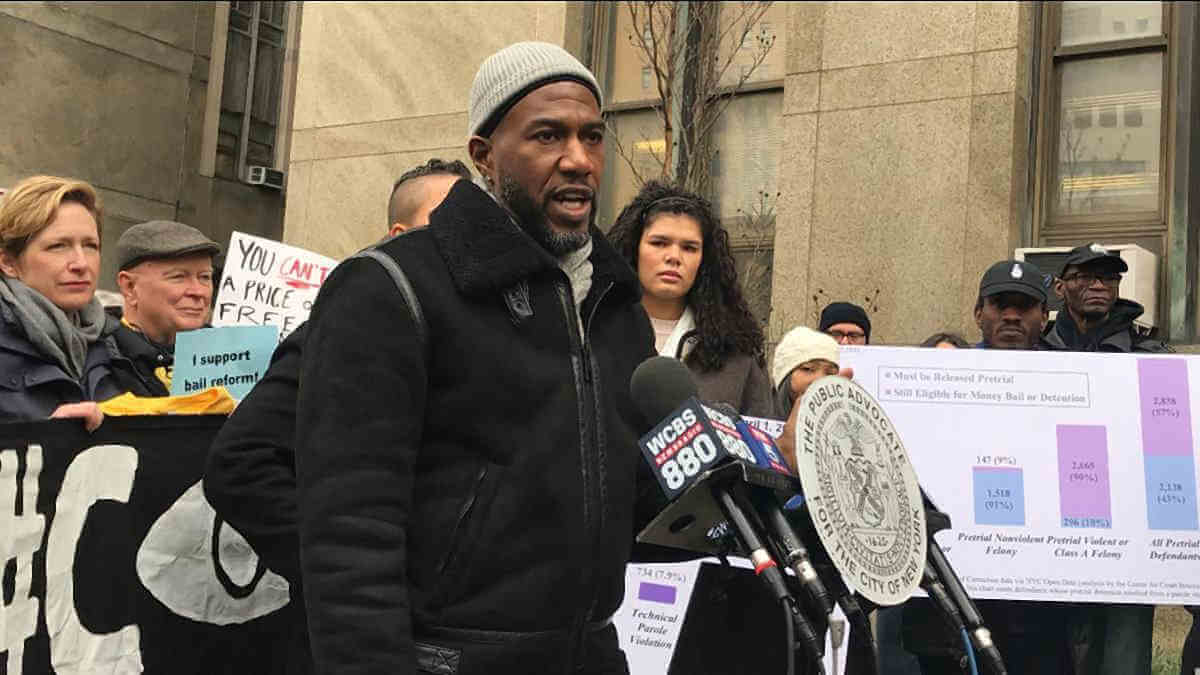Public Advocate Jumaane D. Williams was joined on Tuesday by advocates, including Akeem Browder, brother of Kalief Browder, VOCAL-NY, and community groups to dispel myths and misinformation about the recently-enacted pre-trial reforms.
Williams, the son of Grenadian immigrants said these laws, passed in the 2019 legislative session in Albany, are designed to eliminate “the privilege gap between wealthy offenders who can pay bail and lower-income New Yorkers forced to remain incarcerated because of an inability to pay.”
The group gathered outside New York County Criminal Court, within sight of the ongoing trial for Harvey Weinstein, who paid $1 million and later $2 million to be released pre-trial.
“This new reform – this critical progress – has been in effect for just six days,” Williams said. “Yet, we see top officials reacting to headlines and fear mongering, discussing a potential watering down or clawing back of the gains that have been years in the making.
“In the past, we have seen officials apologize for being on the wrong side of history, for supporting policies that hurt communities in need such as stop, question and frisk, the 1994 crime bill and the three strikes law,” he added. “I urge people to wait, to see the good these new laws will accomplish not only for the benefit of thousands of low-income New Yorkers but so that they are not apologizing for their own opposition to that progress down the road.”
Williams specifically highlighted that less than 12 percent of New York City’s jail population has been sentenced to jail in 2019, and emphasized that bail is meant not as a punishment but as an assurance that a defendant will return to court – “one that poor New Yorkers are unable to pay, and so have been far too often punitively incarcerated pre-trial.”
As of 2018, the public advocate noted that 76 percent of cases already led to release pre-trial.
Williams said the new bail and discovery laws “create more tools for judges and law enforcement to monitor people being released pretrial,” adding that “all people facing criminal allegations will now be subject to a range of possible supervision requirements.”
The public advocate announced that his office would be holding a series of informational sessions around the city “to engage the public on the impact and implementation of the laws.”
“I spent 18 months at Rikers and saw the way money bail devastated the lives of poor people like me,” said Darryl Herring, community leader for VOCAL-NY. “I was proud to fight for bail reform in Albany, because wealth should not determine one’s freedom.
“We can’t go back to the way things were,” he added. “We must embrace the new bail reform laws, because they make our state more fair (fairer) and just for all.”
Tiffany Cabán, public defender and reform advocate, said she spent the last seven years in the halls and courtrooms “of this building right here watching increasing numbers of black and brown and poor New Yorkers behind bars, their families devastated, because they simply could not afford bail, because they struggled with poverty, mental health and substance abuse issues.
“Meanwhile the white, the wealthy, and the well-connected got to buy their constitutional right to the presumption of innocence,” she said. “We need to make sure that we are working together so that none of these reforms, these really important reforms, are rolled back.”
Browder, a criminal justice advocate, said his brother was “inevitably sentenced to death for being accused of stealing a backpack – such an insignificant accusation, with a fatal impact.
“My mother like every parent across New York City never should have to witness and experience a tragedy such as this, which caused her death by a broken heart,” he said. “Reforming New York’s bail came too late to help Kalief, my mother and the countless families that went through similar circumstances.
“But we fought to have change, attained this reform; and, just a week into implementation, we are now faced with this action to repeal,” Browder added. “This isn’t the legacy left due to the sacrifice of Kalief Browder. This is a step towards reviving the system of incarceration.”
Williams said his office would continue to monitor the reforms for their “effectiveness and impact.”

























